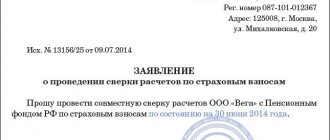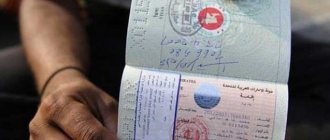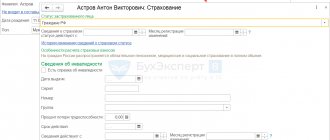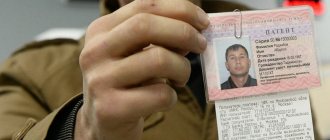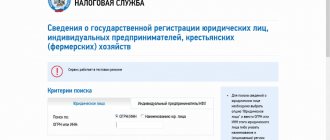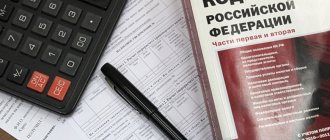Organization of on-site inspections of the Pension Fund of Russia.
In accordance with Art. 3 of Federal Law No. 212-FZ of July 24, 2009 “On insurance contributions to the Pension Fund of the Russian Federation, the Social Insurance Fund of the Russian Federation, the Federal Compulsory Medical Insurance Fund and territorial compulsory medical insurance funds” (hereinafter referred to as Federal Law No. 212-FZ) control over the correctness of calculation, completeness and timeliness of payment (transfer) of insurance contributions for compulsory pension insurance is carried out by the Pension Fund. Initially, the Board of the Pension Fund of Russia (Order No. 127r dated May 11, 2010) approved Temporary Guidelines for organizing on-site inspections. However, this document largely repeated the provisions of the said law and did not give a clear idea of the main aspects to be verified and described in the on-site inspection report. In this regard, in order to establish a uniform law enforcement practice for conducting on-site inspections of insurance premium payers, the Order of the Pension Fund of the Russian Federation Board dated 02/03/2011 No. 34r approved Methodological Recommendations for organizing on-site inspections of insurance premium payers (hereinafter referred to as the Methodological Recommendations). The previously valid document regulating the inspection procedure was declared invalid.
Please note: although the Methodological Recommendations were approved in 2011, this document applies to legal relations during on-site inspections for the billing period from January 1, 2010.
Desk audit: delivery of the organization’s act
Inspectors must hand over a copy of the act to the organization within five working days from the date of signing the act (Part 4 of Article 38 of the Law of July 24, 2009 No. 212-FZ).
Inspectors can transfer the act to the inspected organization:
- personally to the legal or authorized representative of the organization against signature;
- in electronic form via telecommunication channels;
- in another way indicating the date of receipt of the act by the organization (for example, through a courier service).
This follows from Part 4 of Article 38 of the Law of July 24, 2009 No. 212-FZ.
Similar clarifications are contained in the letter of the FSS of Russia dated February 10, 2012 No. 15-03-11/08-1395.
How are candidates for inspection determined?
One of the sections of the Methodological Recommendations is devoted to planning on-site inspections. It includes the selection of insurance premium payers based on a number of criteria, including performance indicators:
- classification as one of the largest payers;
- late submission of individual information;
- availability of payments from the payer that are not subject to insurance premiums;
- application of reduced rates of insurance premiums, including along with the general rate;
- identification of inconsistencies in calculations based on the results of desk audits (including when the payer fails to provide explanations);
- the presence of debt on insurance premiums for more than two reporting periods in a row;
- reduction in accruals compared to the previous period with a constant number;
- repeated changes and adjustments to calculations for accrued and paid insurance premiums;
- the frequency of inspections of the payer no more than once every three years (not taking into account the number of inspections of separate divisions that have a separate balance sheet, current account and accrue payments and other remuneration in favor of individuals);
- receipt from the Federal Tax Service of information about the payer’s participation in schemes to minimize obligations to pay insurance premiums.
For your information: By letter dated February 22, 2011 No. PA-4-2/ [email protected] , No. TM-30-25/1769, the Federal Tax Service and the Pension Fund of the Russian Federation reported that they had entered into Agreement No. MMV-27-2/5 of the Federal Tax Service of Russia, Pension Fund of the Russian Federation No. AD-30-33/04sog dated 02.22.2011 “On interaction between the Federal Tax Service and the Pension Fund of the Russian Federation.” According to this document, tax authorities provide PFR authorities at the federal level with information about tax agents (organizations, individual entrepreneurs, notaries engaged in private practice, lawyers who have established law offices) from whom or as a result of relationships with which individuals received income.
Desk inspection: sending the report by mail
If an organization (its representative) avoids receiving a desk inspection report, the inspector reflects this fact in the report and sends it by registered mail to the organization (separate unit). In this case, the act is considered received after six working days from the date of dispatch. In this case, the countdown of the six-day period begins from the day following the day of dispatch (it is indicated on the stamp). This follows from the provisions of Part 4 of Article 38, Part 2 of Article 4 of the Law of July 24, 2009 No. 212-FZ.
Similar clarifications are contained in the letter of the Federal SSR of Russia dated February 10, 2012 No. 15-03-11/08-1395.
Desk inspection: objections to the inspection report
If you do not agree with the inspectors’ conclusions reflected in the report, then you can formalize your written objections and submit them to the fund that conducted the inspection (Pension Fund of the Russian Federation, Social Insurance Fund of Russia). This must be done within 15 working days from the day you received the act. Supporting documents (certified copies thereof) can be attached to objections. For example, copies of payment orders. This follows from the provisions of Part 5 of Article 38 of the Law of July 24, 2009 No. 212-FZ.
How is the inspection schedule drawn up?
Clause 3 of Art. 33 of Federal Law No. 212-FZ provides that the territorial bodies of the Pension Fund of the Russian Federation and the Social Insurance Fund carry out on-site inspections of insurance premium payers jointly on the basis of annual plans for such inspections developed by these bodies. According to the Methodological Recommendations, the annual schedule of inspections is formed based on the criteria for selecting insurance premium payers in the fourth quarter of the year preceding the year in which the inspections are planned.
The territorial bodies of the Pension Fund of the Russian Federation, when conducting on-site inspections, monitor compliance by insurance premium payers with the legislation of the Russian Federation on compulsory social insurance in terms of the correctness of calculation, completeness and timeliness of payment (transfer) of insurance contributions for compulsory pension insurance paid to the Pension Fund, and insurance contributions for compulsory medical insurance paid to compulsory health insurance funds.
Please note: in accordance with the Agreement on interaction between the Pension Fund of the Russian Federation and the Social Insurance Fund of the Russian Federation on joint on-site inspections of insurance premium payers, concluded on October 28, 2009 No. AD-30-35/10sog, No. 02-43/07-2205P, the schedule is approved by order the head (deputy head) of the territorial body of the Pension Fund no later than December 25 of each current year for each subsequent year.
How to prepare for inspections by the Federal Social Insurance Fund and the Pension Fund of Russia
From the article you will learn:
1. In what order do off-budget funds conduct on-site and desk audits: requirements, deadlines, documents.
2. What points should you pay attention to in order to avoid violations yourself and notice violations by inspectors.
3. What legislative and regulatory acts regulate the conduct of inspections by extra-budgetary funds.
Inspections by regulatory authorities, one way or another, are associated with stress for those against whom they are carried out, be it inspections of the Labor Inspectorate, SES, extra-budgetary funds, tax authorities, etc. But for an accountant, the most “expected” ones are audits by the tax office and funds. And even if you are sure that the documents are in perfect order, and taxes and contributions are calculated absolutely correctly, the message about the upcoming inspection is always unexpected and exciting, especially if the inspection is being carried out for the first time and it is not clear what to expect from the inspectors. Therefore, it is important to have an idea of how inspections are carried out, what actions are taken by representatives of regulatory authorities, and what actions are required of you. In this article, I propose to consider the procedure for conducting inspections of the FSS and the Pension Fund of the Russian Federation in order not only to avoid violations, but also to identify violations on the part of the inspectors.
The procedure for conducting inspections of the Social Insurance Fund and the Pension Fund of Russia in accordance with the law
Legislatively, the procedure for conducting inspections by extra-budgetary funds is regulated by Chapter. 5 of the Federal Law of July 24, 2009 No. 212-FZ “On insurance contributions to the Pension Fund of the Russian Federation, the Social Insurance Fund of the Russian Federation, the Federal Compulsory Medical Insurance Fund.” In accordance with the Law, inspections are carried out to monitor the correctness of calculations, as well as the completeness and timeliness of payment of compulsory social insurance contributions.
The procedure for conducting inspections, timing and requested documents depend on what kind of inspection it is: desk or on-site. In short, a desk audit is a check of submitted reports, which is necessarily carried out by specialists from the Social Insurance Fund and the Pension Fund of the Russian Federation, practically without your participation. But with an on-site inspection, the situation is more serious: the period under review is longer and the list of requested documents is much wider.
In more detail, the procedure and features of conducting desk and on-site inspections of the FSS and the Pension Fund of the Russian Federation are presented in the table:
| Conditions | Desk inspections (Article 34 of Law No. 212-FZ) | On-site inspections (Article 35 of Law No. 212-FZ) |
| Who carries out the checks | FSS, Pension Fund separately | The FSS and the Pension Fund of Russia only jointly in accordance with the schedule of on-site inspections. Tax authorities may also be involved in audits of policyholders who apply reduced insurance premium rates. |
| Location | On the territory of the FSS, Pension Fund carrying out the inspection | On the territory of the policyholder. If the policyholder does not have the opportunity to provide premises for the inspection - on the territory of the Social Insurance Fund, Pension Fund of the Russian Federation, conducting the inspection |
| Reason for inspection | No special solution required | Decision of the head (deputy head) of the Social Insurance Fund, Pension Fund of the Russian Federation to conduct an inspection |
| What documents are checked | Reports to the Social Insurance Fund, Pension Fund; When applying for reimbursement of funds from the Social Insurance Fund - documents confirming expenses incurred. | Any documents confirming the correctness of calculations for compulsory social insurance (accrual, payment, amounts of compensation from the Social Insurance Fund) |
| Check period | 3 months from the date of submission of the report | 2 months from the date of the decision to conduct an inspection; 1 month when inspecting a separate division that has its own balance sheet, current account and makes payments to individuals. |
| Suspending the scan | Not provided | A decision to suspend an inspection is made in the following cases:
During the period of suspension, all original documents of the policyholder must be returned, and all activities related to the inspection must be stopped. The period of suspension of the inspection is not included in the period for conducting the inspection. The total period of suspension cannot exceed 6 months, and in the case of receiving information from foreign states - 9 months. |
| Verified period | Reporting period to the Social Insurance Fund, Pension Fund | No more than 3 years preceding the year of inspection |
| Frequency of inspections | As reports are submitted to the FSS, Pension Fund | No more often than once every three years (excluding inspections of separate divisions) During liquidation and reorganization, an inspection can be carried out regardless of the time of the previous inspection |
| Requirements during the inspection | Request for clarification or correction. Sent to the policyholder if inconsistencies or errors are identified during the inspection. The policyholder must provide such explanations or make corrections within 5 days from the date of receipt of the request. | Requirement to provide documents. Within 10 days from the date of receipt, the policyholder must provide the relevant documents or, within 1 day following the day of receipt of the claim, notify in writing of the impossibility of providing documents within the established time frame, indicating the reason and possible deadlines. The supervisory authority, within 2 days from the date of receipt of such notification, makes a decision: to extend the deadlines or leave it unchanged. The requested documents are provided in the form of copies certified by the policyholder (notarization is not required by law). Original documents may be provided for verification only on the territory of the policyholder. |
| Test results | If during the inspection no violations of the law are revealed, the results of the inspection are not reported to the policyholder. If, after the policyholder provides explanations and corrections, or if they are not provided by the supervisory authority, a violation of the law is established, then within 10 days from the date of expiration of the inspection period, an inspection report is drawn up. | No later than the end of the inspection, representatives of the inspection authorities draw up a certificate of the on-site inspection. Within 2 months from the date of drawing up the certificate, an inspection report is drawn up. |
| The inspection report is handed over to the policyholder within 5 days from the date of its signing. In case of disagreement with the results of the inspection contained in the report, the policyholder has the right to write written objections within 15 days from the date of receipt of the report. | ||
| Making a decision based on the results of the inspection | Within 10 days from the date of expiration of the deadline for filing written objections, a review of the inspection materials must be scheduled. The head (deputy head) of the inspection body is obliged to notify the insured of the time and place of consideration of the inspection materials. The policyholder has the right not to participate in the consideration of inspection materials. Based on the results of reviewing the inspection materials, the supervisory authority makes a decision:
The said decision comes into force after 10 days from the date of delivery to the policyholder. | |
What to pay special attention to when checking the FSS and the Pension Fund of the Russian Federation in order to avoid violations yourself and identify violations by inspectors
1. The bodies of the Social Insurance Fund and the Pension Fund of the Russian Federation are obliged to notify the policyholder of the scheduled on-site inspection no later than 3 days before its start, either by registered mail with notification, or in any other available way (Clause 12, Article 9 of the Federal Law of December 26, 2008 No. 294- Federal Law “On the protection of the rights of legal entities and individual entrepreneurs in the exercise of state control (supervision) and municipal control”). Please note that inspectors can notify by phone or fax (as most often happens), but in this case it is almost impossible to prove the fact of such notification on their part. I am not at all saying that policyholders should ignore such notices, far from it. But in an extreme situation, knowledge of this circumstance can be very useful.
2. The deadlines established for the interaction of the policyholder with the bodies of the Social Insurance Fund and the Pension Fund of the Russian Federation during inspections are calculated in working days , since the law does not indicate calculation in calendar days (clause 6 of Article 4 of Law No. 212-FZ).
3. Inspectors have the right of access to the insured’s territory only upon presentation of official identification and a decision to conduct an inspection , which specifies these particular representatives of the regulatory authorities. At the same time, inspectors can enter residential premises only with the consent of the residents (Clause 1, 3, Article 36 of Law No. 212-FZ).
4. It makes no sense to impede the access of inspectors : firstly, this is an administrative offense (Article 19.4.1 of the Code of Administrative Offenses of the Russian Federation), and secondly, inspectors have the right to independently calculate the amount of insurance premiums based on available data or by analogy, and this is unlikely the amount will be less than the real one (Article 36, paragraph 2 of Law No. 212-FZ).
5. An on-site inspection can only be carried out in the presence of the head of the person being inspected or his authorized representative (Clause 2 of Article 15 of Law No. 294-FZ). Therefore, if during the inspection period the director of the policyholder plans to go on vacation, a business trip, etc., it is necessary to prepare in advance an order for the appointment of an acting director during his absence and draw up a power of attorney. Otherwise, this will be considered as evasion of inspection, which entails administrative liability under Art. 19.4.1 Code of Administrative Offenses of the Russian Federation. Please note that in order to be held accountable for evading an inspection, the regulatory authorities must have evidence that they properly notified about the upcoming inspection - this is where point 1 comes in handy.
6. Representatives of regulatory authorities must hand over documents during the inspection only to the head of the policyholder or his authorized representative. Transferring documents to other persons will be a violation on the part of the inspectors.
7. Documents such as: a requirement to provide documents during an on-site inspection, an inspection report, a decision based on the results of an inspection, inspectors can submit in one of the following ways:
- personally against signature - to the manager or his authorized representative,
- in electronic form via telecommunication channels (using digital signature),
- by registered mail.
! Please note: inspectors take the address for sending a registered letter from the data contained in the Unified State Register of Legal Entities. Therefore, if your actual address does not coincide with your legal address, you may not receive the letter, but the inspectors in this situation act completely legally. You also need to take into account that the date of receipt by law is considered to be the sixth day from the date of sending the registered letter, regardless of actual receipt (Clause 1, Article 37 of Law No. 212-FZ)! In this regard, in order to avoid problems with receiving documents from the Social Insurance Fund and the Pension Fund of the Russian Federation and to comply with the deadlines specified therein, it is better to receive documents in person, especially since inspectors, as a rule, themselves prefer this method.
8. The policyholder may transfer documents requested during the inspection in the following ways (Clause 1, Article 37 of Law No. 212-FZ):
- Personally - the head or representative of the person being inspected (by proxy). In this case, evidence of the provision of documents can be a copy of the list of transferred documents with a mark from the regulatory authority.
- By mail - a valuable letter with an inventory of the contents. When submitting documents by mail, confirmation will be an inventory of the contents in the valuable letter and a postal receipt.
- In electronic form via telecommunication channels (using digital signature). However, at the present time (at the time of writing) the FSS and the Pension Fund of the Russian Federation have not developed a format for transmitting documents electronically, so this method of transmitting documents is not available.
So, we have examined in some detail the procedure for conducting inspections by extra-budgetary funds in accordance with the law. And in the next article I will talk about my personal experience of passing an on-site inspection by the FSS and the Pension Fund of the Russian Federation and share practical recommendations.
If you find the article useful and interesting, share it with your colleagues on social networks!
If you have any comments or questions, write to us and we’ll discuss them!
Legislative and regulatory acts
1. Federal Law of July 24, 2009 No. 212-FZ “On insurance contributions to the Pension Fund of the Russian Federation, the Social Insurance Fund of the Russian Federation, the Federal Compulsory Medical Insurance Fund”
2. Federal Law of December 26, 2008 No. 294-FZ “On the protection of the rights of legal entities and individual entrepreneurs in the exercise of state control (supervision) and municipal control”
3. Code of Administrative Offenses of the Russian Federation
Codes and Federal laws of the Russian Federation can be viewed on the Official Internet portal of legal information https://pravo.gov.ru/
The decision to conduct an on-site inspection.
The basis for an on-site inspection is the decision of the head (deputy head) of the body monitoring the payment of insurance premiums at the location of the organization, its separate division or at the place of residence of an individual. The decision to conduct an on-site inspection is made in two copies according to Form 9-PFR, approved by Order of the Ministry of Health and Social Development of the Russian Federation dated December 7, 2009 No. 957n “On approval of document forms used in monitoring the payment of insurance premiums” (hereinafter referred to as Order No. 957n) (Appendix 14 ):
- the first copy is handed over for review to the inspected insurance premium payer (his authorized representative) on his territory (on his premises) or on the premises of the territorial body of the Pension Fund of the Russian Federation - depending on the location of the inspection;
- the second copy is attached to the materials of the on-site inspection.
After the payer of insurance premiums familiarizes himself with the decision and signs it, the official of the body monitoring the payment of insurance premiums conducting the on-site inspection hands the payer a request for the submission of documents necessary for the inspection. This requirement is drawn up by an official of the body monitoring the payment of insurance premiums, conducting an on-site inspection, according to Form 14, approved. Order No. 957n (Appendix 21).
Desk inspection: delivery of the decision
Within five working days after the decision is made and formalized based on the results of the inspection, the fund must deliver it to the organization. The period is counted from the day following the date when the decision was signed (Part 13, Article 39 of the Law of July 24, 2009 No. 212-FZ). For example, if the decision on the inspection was made on March 7, 2014 (Friday), then the fund must deliver it to the organization no later than March 17, 2014.
Employees of the extra-budgetary fund can convey the decision in the following ways:
- personally to the legal or authorized representative of the organization against signature;
- by registered mail;
- in electronic form via telecommunication channels.
A decision sent by registered mail is considered received after six business days from the date of mailing. In this case, the countdown of the six-day period begins from the day following the day of dispatch (it is indicated on the stamp).
This follows from the provisions of Part 13 of Article 39 and Part 2 of Article 4 of the Law of July 24, 2009 No. 212-FZ.
As a general rule, the inspection decision comes into force 10 days from the date it is delivered to the organization (Part 12, Article 39 of the Law of July 24, 2009 No. 212-FZ).
After this, the extra-budgetary fund, within 10 working days, will send to the organization a demand to pay arrears on insurance premiums, penalties and fines accrued based on the results of the audit (Part 3 of Article 22, Part 14 of Article 39 of the Law of July 24, 2009 No. 212 -FZ). This requirement must be fulfilled within 10 working days after receiving it. Although the requirement itself may set a longer period (Part 5 of Article 22 of the Law of July 24, 2009 No. 212-FZ).
If you do not agree with the inspection decision or with the additional amounts accrued therein, you can appeal it (Article 53 of Law No. 212-FZ of July 24, 2009). The decision of the territorial branch of the fund can be appealed to the regional branch or in court. Moreover, this can be done both simultaneously and sequentially (Part 2 of Article 54 of the Law of July 24, 2009 No. 212-FZ).
Requirements for submission of documents.
Bodies monitoring the payment of insurance premiums in accordance with the legislation of the Russian Federation on insurance premiums have the right to demand from the payer of insurance premiums documents in the forms established by state bodies that serve as the basis for the calculation and payment (transfer) of insurance premiums, as well as documents confirming the correctness of calculation and timeliness payment (transfer) of insurance premiums. This is provided for in Art. 37 of Federal Law No. 212-FZ. According to Part 2 of this article, the requested documents are presented in the form of copies certified by the person being checked.
Let us note that the legislation does not provide for the requirement of notarization of copies of documents submitted to the territorial body of the Pension Fund of the Russian Federation, as well as the seizure of original documents.
Please note: the number of requirements that inspectors make to the insurance premium payer during an on-site inspection is not limited. If necessary, the body monitoring the payment of insurance premiums has the right to familiarize itself with the originals of all documents subject to verification (Part 4, Article 37 of Federal Law No. 212-FZ).
The documents that were requested during the on-site inspection must be submitted by the payer of insurance premiums within 10 working days from the date of delivery of the relevant request (Clause 4, Part 2, Article 28, Part 5, Article 37 of Federal Law No. 212-FZ).
During an on-site inspection, when issuing a requirement for the presentation of documents subject to inspection, the following should be followed:
- Resolution No. 71a of October 30, 1997 “On approval of unified forms of primary accounting documentation for accounting of labor and its payment, fixed assets and intangible assets, materials, low-value and wear-out items, work in capital construction”;
- Resolution No. 55 dated 01.08.2001 “On approval of the unified form of primary accounting documentation No. AO-1 “Advance report”;
- Resolution No. 1 of 05.01.2004 “On approval of unified forms of primary accounting documentation for recording labor and its payment.”
Please note: in accordance with Art. 48 of Federal Law No. 212-FZ, the refusal of the person being inspected to submit the documents requested during an on-site inspection or failure to submit them within the established time frame is recognized as an offense and is grounds for prosecution in the form of a fine of 50 rubles. for each document not submitted.
Documentation
Be prepared, upon request, to provide the inspectors with documents related to the calculation and payment of insurance premiums. There are 10 days from the date of receipt of the Request to prepare the necessary documents and submit them. If the company is unable to provide documents on time, it is necessary to notify the inspectors in writing (in any form), indicating the reason and new deadlines for submission.
For refusal to provide documents or violation of deadlines, inspectors can impose a fine of 200 rubles for each document; There is also an administrative penalty for officials from 300 to 500 rubles.
Employees of the Pension Fund of the Russian Federation and the Social Insurance Fund have the right to demand all documents related to the remuneration of employees, the calculation of insurance premiums, and constituent documents. Expected list of documents:
- charter, memorandum of association, licenses;
- bank and cash documents;
- labor and GPC agreements with individuals;
- primary accounting documents, accounting policies;
- personnel documentation (hiring orders, employee personal cards, staffing tables, leave orders, bonus orders, time sheets, pay slips, etc.);
- documents related to insurance coverage (sick leave certificates, employee statements, orders, supporting documents).
Inspectors do not have the right to take original documents with them; they can only work with them on the company’s premises. If you need to pick up documents, you can provide copies of the originals, certified by the seal of the organization and the signature of the director.
Inspectors will look for discrepancies between the data in documents and the data in reports, violations of the law, and the correctness of data reflected in documents that affect the calculation of insurance premiums.
Location of the on-site inspection.
Typically, an on-site inspection takes place on the territory of those being inspected. Access to the territory or premises of the insurance premium payer by officials of the body for control over the payment of insurance premiums who directly conduct an on-site inspection is carried out upon presentation by these persons of official identification and a decision of the head (his deputy) of the body for control over the payment of contributions to conduct an on-site inspection of this payer.
Please note: if the payer of insurance premiums does not have the opportunity to provide premises for an on-site inspection, an on-site inspection can be carried out at the location of the territorial body of the Pension Fund of Russia.
Periods and timing of on-site inspections.
The duration of the on-site inspection of the insurance premium payer is determined by the head (deputy head) of the territorial body of the Pension Fund.
Section VI of the Guidelines states:
- as part of an on-site inspection, a period not exceeding three calendar years preceding the calendar year in which the decision to conduct the inspection was made;
- the period for conducting an on-site inspection is calculated from the day the decision on its appointment is made until the day the certificate of the inspection is drawn up, and the inspection cannot last more than two months;
- the total period of suspension of the on-site inspection cannot exceed six months (Part 18, Article 35 of Federal Law No. 212-FZ);
- If within six months the body monitoring the payment of insurance premiums was unable to obtain the requested information from foreign government bodies within the framework of international treaties of the Russian Federation, the period for suspending the inspection may be increased by another three months.
During the period of suspension of the on-site inspection, the actions of the body monitoring the payment of insurance premiums on requesting documents from the premium payer are suspended, to whom in this case all original documents requested during the inspection are returned, and the actions of the body monitoring the payment of insurance premiums on the territory (premises) are also suspended. payer related to the specified check.
Types of inspections and their periods
The Pension Fund of the Russian Federation, through its territorial divisions, conducts desk and on-site inspections of organizations (Article 33 of Law No. 212-FZ of July 24, 2009). In both cases, the goal is the same - to check whether contributions for pension and compulsory health insurance have been correctly calculated and paid. But the periods covered by such checks, as a rule, differ. You can quickly navigate all the timing and periods of on-site and desk inspections using the comparative table. If payments do not go to the Pension Fund, then read how to transfer money from a non-state pension fund.
As part of the desk audit, employees of the territorial office of the fund control only the period for which the organization compiled and submitted the calculation in accordance with the RSV-1 Pension Fund form (Part 1 of Article 34 of the Law of July 24, 2009 No. 212-FZ). For example, this is the calculation of the RSV-1 Pension Fund for the nine months of 2015. Then, as part of a desk audit of this calculation, the Pension Fund of the Russian Federation can check whether contributions have been calculated correctly only for these nine months. Although during the audit, fund employees can use information for other reporting periods.
But as part of an on-site inspection, fund employees have the right to check a period within three calendar years. Those that precede the year in which such an inspection was appointed (Part 9 of Article 35 of the Law of July 24, 2009 No. 212-FZ). And by the way, specific periods of the on-site inspection must be indicated in the decision to conduct it (clause 3, part 4, article 35 of the Law of July 24, 2009 No. 212-FZ).
What documents must be presented upon request of the inspectors?
Depending on the degree of coverage of documents and information being checked, a complete or random check can be carried out. The following are subject to inspection:
- when applying the continuous method - all documents and information related to the calculation of insurance premiums;
- when applying the sampling method - selected elements of one reporting item or group of similar transactions, which allows you to draw conclusions regarding the elements of the entire article or group of transactions.
For your information: the volume of documents to be checked and information about the activities of the payer of insurance premiums is determined independently by the officials conducting the inspection, based on the volume of data to be verified, the state of the payer’s accounting records, as well as the likelihood of violations in the calculation of insurance premiums.
In accordance with clause 7.4 of the Methodological Recommendations, the set of documents to be requested from the payer of insurance premiums to conduct an on-site inspection includes:
- constituent documents (charter and (or) constituent agreement, regulations);
- orders on accounting policies;
- permitting documents (licenses valid during the period under review, etc.);
- calculations of accrued and paid insurance premiums for compulsory pension insurance, compulsory health insurance for the period under review;
- accounting statements of the payer of insurance premiums for the audited period, including annual reports, explanatory notes to them, audit reports;
- synthetic registers of accounting (tax) accounting for the audited period (general ledger, memorial orders, books of income and expenses and business transactions, order journals, statements (turnover balance), cash book, etc.);
- analytical accounting registers (subconto cards, etc.) for accounts of settlements with personnel for wages, social insurance and security, with accountable persons, cash accounting;
- cards for individual accounting of the amounts of accrued payments (other remunerations) and insurance premiums. The recommended form is attached to the Letter of the Pension Fund of the Russian Federation dated January 26, 2010 No. AD-30-24/691 and the FSS of the Russian Federation dated January 14, 2010 No. 02-03-08-56P;
- organizational and administrative documents, contracts and additional agreements to contracts (orders, collective agreements, employment contracts, civil contracts, agreements concluded with individuals, contracts and other documents related to establishing the procedure and amount of payments and other remunerations accrued in favor of individuals);
- bank and cash documents (bank statements, payment orders (requirements), other documents);
- primary accounting documents confirming the facts of the payer’s business activities (including accounting, settlement and payment documents) in relation to all payments and other remunerations accrued by payers of insurance premiums for the billing period in favor of individuals. These documents may include statements of accrued income in favor of individuals, cash receipts, statements of advance payments, salaries, bonuses and other remunerations, bank payment documents for crediting funds to bank cards and accounts of individuals.
Additionally, during an on-site inspection, copies of individual (personalized) accounting document forms in the compulsory health insurance system may be requested, including information containing information on accrued and paid insurance contributions for compulsory pension insurance and the insurance experience of the insured person for the period being audited.
Please note: a possible list of documents that may be required during an on-site inspection is given in Appendix 1 to the Methodological Recommendations.
What documents can the Pension Fund of the Russian Federation request during an inspection?
As part of a specific inspection, inspectors have the right to submit requests for the provision of documents.
The requested documents must relate to the subject of the inspection.
In addition, constituent documents, orders on accounting policies, accounting, organizational, administrative and other documents are subject to request from the institution.
A possible list of documents that may be required is given in the methodological recommendations approved by Order of the Board of the Pension Fund of the Russian Federation dated 02/03/2011 No. 34r.
Main aspects of inspection and description in the on-site inspection report.
These include:
- category of the insurance premium payer being inspected;
- timeliness and completeness of submission by the payer of contributions of calculations and individual information to the territorial bodies that exercise control over the payment of insurance premiums;
- checking the correctness of the contribution payer’s determination of the object subject to insurance premiums and the base for their calculation;
- the correctness of determining the amounts not subject to insurance premiums by contribution payers making payments and other remuneration to individuals;
- checking the correctness of calculation and payment (transfer) of insurance premiums.
What do inspectors do if violations are detected?
If during the on-site inspection, violations of the legislation of the Russian Federation on compulsory social insurance were revealed in terms of the correctness of calculation, completeness and timeliness of payment (transfer) of insurance contributions to state extra-budgetary funds, the territorial body of the Pension Fund of the Russian Federation in accordance with the requirements of the Methodological Recommendations:
- carries out the selection of documents confirming separately each fact of identified violations;
- makes additional calculations of insurance premiums;
- forms proposals to hold the insurance premium payer accountable for committing an offense or to refuse to hold the insurance premium payer accountable for an offense, as well as to eliminate identified violations.
For each identified fact of violation of the law, copies of the relevant documents must be attached to the inspection materials.
Appealing the pension fund inspection report
The policyholder has the right to object to the inspection report within 15 days from the date of receipt.
In addition, a complaint against the inspection report can be filed with a higher authority of the pension fund and/or in court. In this case, you can simultaneously appeal to a higher authority and to the court.
When appealing, it is necessary to point out the violations committed by the inspectors during the inspection, and also indicate that certain conclusions of the inspectors are not unreasonable, and therefore ask to declare the act invalid. Most often, decisions to prosecute are challenged, however, one should not forget about challenging the inspection report.
HEALTHY:
